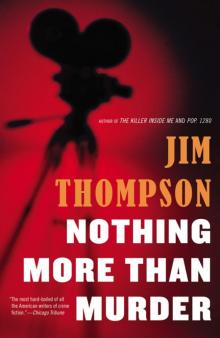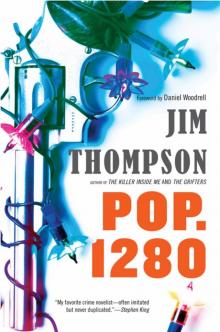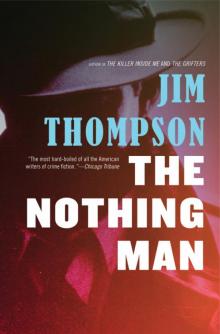- Home
- Jim Thompson
Now and on Earth Page 6
Now and on Earth Read online
Page 6
“If he goes, I’m not,” said Mom. “The reason he doesn’t get anywhere is because no one likes him. He’s just a big sulking calf.”
“No one’s going but me,” I said.
“Don’t be such a pig, Jimmie,” said Frankie.
“You wouldn’t want us to stay here, just barely getting by, if we could do well out there, would you?” asked Mom.
“I’ve been trying to think what I could wear,” said Roberta. “I guess my green slack suit would be the best.”
“Now, look here!” I said. “You folks just can’t get up and tear off like this. It’s absolutely crazy!”
“Well, of course if you don’t want us—” said Mom.
“He’s always trying to get away from me, Mom,” said Roberta. “Ever since we got married. He’s not going to, though.”
Well—we came to California.
I felt pretty sorry for Chick. Chick is an expert mechanic on pin-ball machines and other gambling devices; it’s probably the only thing he’s any good at. Since they were outlawed in the Southwest, he’s had to work at anything he could get at about a fourth of what he used to make. There really wasn’t room for him in the car, and we did promise we’d look out for him. But, after we got here, we were so busy looking out for ourselves that we couldn’t be bothered a great deal. He wrote Frankie a rather nasty letter, then one to the family in general. So now none of us knows quite what to do. Frankie wants to see him, I’m sure. But Mom and Roberta are so angry still that seeing him would mean not seeing them. So—
I don’t know why the family is so damned casual about some things and so intense about others.
I couldn’t get an extension on my fellowship; they were afraid that the war would so change things that any material I gathered would have no value. Or so they said. I wrote to a couple of Hollywood writers I’d corresponded with. They didn’t reply. (And I didn’t blame them.) Fawcetts was willing to give me a try at studio gush and gossip, but the Hays office wouldn’t accredit me. There were too many writers only half-living in Hollywood already.
In the end, I went out to the aircraft factory, hoping they wouldn’t hire me and wondering what I’d do if they didn’t. And that’s about all.
It’s hard to say how I feel about the place. I’d like to be disinterested, but I can’t and hold my job. And, as jobs go, it’s no worse than any would be that I had to hold. It’s just something to endure, something to live through, numb yet painfully aware of what is going on around me. It’s like—well, I’ll try to give you an example.
Three months after Mack was born a doctor acquaintance of mine performed a vasectomy on me. It was around Christmas, and the only payment he exacted was ten fingers out of a quart of rye; in advance, yes. I think he must have served an apprenticeship at cutting out baseball covers, because I was going around in a sling for weeks afterward. But what I started to say was—to strike a parallel with my job—it drove me nuts without actually hurting at all. I was so shot full of local that he could have trimmed out my appendix without hurting me. But that snipping and slicing finally got me so bad that I raised up and whanged the hell out of him, and he had to sit on my chest to finish.
9
The plant, in this, my fourth week, is beginning to make a little sense. There is still a great deal that confuses me, but I am getting a vague idea of what it’s all about. I should have sooner, but for my timidity.
On the day I took over Gross’s job, Moon remembered his promise to show me around. We went down to the Drop-hammer Department, first, and watched the manifolds and other castings being pounded out. They are as large as a small room, some of these hammers, and when they are dropped the concrete floor shakes for hundreds of feet around. The men are the huskiest I’ve seen, and you can see just about all of them because they’re practically naked. Their bodies, and particularly their arms, are covered with scars from the splattering metal and from cleaning out the hot pots.
I didn’t think that was as it should be. There are very few things with which I can’t find something wrong. I suggested to Moon that it would be better if they bundled themselves against the heat and other hazards of their work as cooks do.
He replied, “These men have been working this way a long time and they probably know what’s best.”
We only looked through the door of the Planishing Department, and that was enough to give me a headache for the rest of the morning. Here the castings are run back and forth through a series of rapidly moving hammers until they are beaten smooth; and the noise is too frightful to describe. It has no cadence; you can’t accustom yourself to it. Every one of the hundreds of thousands of blows of the hammers rips right through you.
Through a side door leading into the yard, I noticed several men wandering idly around, massaging their ears and heads, smoking but not talking.
“Some of the planishing boys,” said Moon. “They get a rest period every half-hour or so. Have to have it or they’d go nuts.”
“I suppose they get pretty good money,” I said.
“Not so much. They’re here because they can’t get out of it. At least, most of them are. They’re put in here, not knowing what planishing means, and pretty soon they begin to build up seniority so they hang on, hoping they’ll get a break and be transferred to some other department. If the company gives you a transfer, you know, you don’t lose your seniority. But if you demand it, they can start you in in a new department at a beginner’s rate. That’s pretty hard to take. When you’ve been in a department four months, you draw twelve and a half cents an hour above the minimum—a dollar a day more. A man with a family is going to do a lot of thinking before he gives that up.”
“But most of these fellows are just kids,” I said. “They’re not old enough to have families. I should think—”
Moon gave me one of his solemn looks which, someway, have the effect of making me feel even more the idiot than I am.
“Ever hear of the draft act, Dilly?”
“Yes. Of course, I have.”
“Well, where do you think these young fellows would be if the company didn’t want to have them deferred?”
Well…
I didn’t have any suggestions that time.
We went out to the carpenter shop where the wing spars are made, and then we came back inside and started up the sheet-metal forming line. It’s called a line, but it’s actually four, each about fifty yards long. Each line consists of possibly a hundred benches and workmen; practically every operation is done with handtools. At the beginning of the “line” is a metal-crimping machine, from which the parts come in rough form. From this they go from bench to bench, each man doing his particular little task, until the last bench is reached. There, the move-boys pick them up and trundle them off to the paint and dope shops.
That is as far as I got. In fact, I didn’t get quite that far; I progressed only far enough to reach certain conclusions. Midway in an explanation of one of the processes, Moon abruptly excused himself and hurried off. And in something less than five minutes a company guard had me by the elbow and asked me what I was doing.
10
I’m a new man,” I said. “My lead-man has been showing me around.”
“Who is your lead-man?”
I told him.
“Where’d he go to?”
“I don’t know.”
“Let’s take a look at your identification card.”
I gave him my card, and he studied it carefully, looking now and then from it to me. Rather reluctantly, I thought, he handed it back.
“I guess it’s all right,” he said. “But don’t waste any time. We’re all here to work.”
I went on by myself, and the fifteen minutes or so I spent wandering around before I returned to the stockroom were, of course, absolutely wasted. I didn’t take time to see very much, and what I did see meant nothing. I was that badly frightened. I naturally told Moon I’d made out all right; I didn’t dare risk another interview with a guard.
> So, as I say, I’ve had to pick up little by little what I should have known at the start.
Only a relatively small number of the parts which I saw being made that day reach us. Hundreds of them come through as parts of assemblies. Others are being made for other plants. For instance, we make manifolds for several factories; we have the men and equipment to make them with and they don’t. For the same reason we have to buy stuff from them. No aircraft factory is self-sufficient. The items which we sell or buy vary from day to day, depending upon the availability of labor, equipment, and materials.
I have, in all, four types of parts to keep record on: assembly, sub-assembly, and regular assembly-line issue. The fourth consists of parts such as cowling and firewalls, which, because they are bulky and difficult to handle, go direct to the assembly line—a fact which does not excuse us from keeping track of them. When a plane reaches a certain stage, it has a definite number of parts. We—I—am supposed to know what those parts are, regardless of whether I have seen them, and to show them as having been issued.
There is something screwy about this. When I think of what it is, I will tell Moon about it. I am also going to find out why we are constantly short on some parts and invariably long on others.
We issue, or try to issue, parts in units of twenty-five. Not twenty-five pieces of each part, but enough for twenty-five planes. A flap requires only one nose-cover, but it uses sixteen ribs of a certain type. So the unit number on the nose-cover is 1, but it is 16 on the rib.
The release books are, at first glance, the ultimate in simplicity. The first, which is our major concern since we have not yet completed twenty-five planes, consists of twelve bills-of-material, one for each station. On the left side of the bill is the part number, its description, and the unit number. On the right, opposite each number, are twenty-five squares. When a part is received—say, forty-eight pieces of L-1054, which has a unit number of six—I draw a wavy line through eight of the squares opposite that number. When the forty-eight pieces are issued, I merely block the squares in.
But—instead of getting forty-eight pieces I may get forty-nine. Then I must carry my wavy line through eight and one-sixth squares, and they are extremely tiny. If six were the maximum unit number, I might stay somewhere near straight, as far as this particular difficulty is concerned. But the unit number on some parts runs up to one hundred and sixty-four. And there’s no way on God’s green earth of splitting the squares that fine.
I told Moon about it; and a lot of good that did.
“Well,” he said, feeling in his pocket for an apple, “a few pieces like that don’t make much difference, Dilly. Just do the best you can.”
“But it’s not just a few pieces,” I said. “You’ve got seven releases—seven hundred and fifty ships—or a total of thirty bills of material for each assembly station. By the time you multiply even a very small error by thirty you’re going to be in one hell of a mess.”
“Well,” he said again, “what do you want to do about it?”
I didn’t know. “I’m just trying to explain why the records are off,” I said. “I just didn’t want you to think it was my fault.”
He climbed up on my stool on his knees and hurled the apple core over the fence. And far down the line, above the whine of unishears and the boop-boop of the rivet guns, there rose a yell.
“Well, as long as it’s only a few pieces, Dilly—”
“But, Moon. I just got through saying—”
“—we don’t care.”
He sauntered off.
That was in my third week here, and this is the end of my first month. And I’m beginning to catch on to things better. But it seems like the more I understand, the less I know—the more trouble I find.
The design for our plane hasn’t been frozen yet. Engineering changes are being made every day—almost every hour. And they’re completely balling up our records system which is static in design. We’re getting through dozens of parts that aren’t on the bills of material. Some of them are effective on the first plane; some on the tenth; and so on. And I don’t know how the hell to show the things. I don’t know whether they’re replacing other parts or whether they’re outright additions.
Moon says if they’re not on the bills of material, why to hell with them; and I have let a lot of them slip. But that isn’t going to do. The stockroom is getting filled with parts that we have no record on, and consequently when we make our issues we’re not throwing them out. This is going to mean only one thing in the end. The Government will reject the planes because they do not meet specifications; and a certain stockroom bookkeeper is going to be on the spot.
And, still, that isn’t all.
When a part is replaced or supplemented by another, the unit number on the original part is naturally changed. For example, where, at one time, seventy-five pieces of a part were required to complete twenty-five ships, we may now use only fifty. But—but what in the hell are you going to do when your records show that you’ve already issued more than enough of the first part for twenty-five planes? Where are you going to put the supplementary or additional parts?
I can see where the difficulty is. The fact that we have issued parts for twenty-five planes doesn’t necessarily mean that the assembly station has put them to productive use. They’ve been ruined, or rejected by inspection. Knowing this, however, doesn’t help.
I talked to Moon about it (and he, by the way, seems to be getting a little weary of my talking).
“Well, what do you want to do about it, Dilly?”
“The office must keep a record on scrapped and rejected parts. I want to see it.”
“They don’t know anything up there. The only way they know about scrapped parts is when they start running short. And you can’t prove they’ve been scrapped, then. The guys out in Final will say that our records are wrong—that they never got the parts.”
“But the office would know by checking on raw stores—”
Moon shook his head complacently. “No, they wouldn’t, Dilly. You’ve got Experimental and Testing to reckon with. And then we’re swapping and lending stuff all the time to other plants. Up in Purchased Parts this morning I noticed we had an invoice for forty static-ground tailwheel tires. We paid for ’em and we received ’em, but we don’t have them on hand and Final Assembly doesn’t have them. God knows where they are.”
“If I could just get a report on rejections, then—”
“Wouldn’t do any good. When a part is rejected, it goes to the chief inspector. If he rejects it, it goes back to the department responsible for the flaws. They let it lay around a while, and then if it can’t be reworked and sent back to Final, they scrap it and send the rejection tag up to the office. Or, maybe, if rejections have been running heavy against them, they throw it away. Anyway you look at it, though, we don’t learn about the rejection for weeks, and it’s too late then to help us.”
I didn’t say anything, but I guess I looked a lot.
“Don’t let it get you down, Dilly,” said Moon. “You’re doing all right. As well as could be expected.”
So that’s the way things are. Or were. For they’re getting worse by the moment. I can’t say that I’m bored any more. I don’t say that the work is beneath me. It would take a genius to work his way out of this mess.
I don’t know what in the name of God to do. I’ve been cutting down on the liquor at night, so that my head will be clear, but it makes me so restless and sleepless that I’m not sure it’s a good idea. I’ve tried to talk to Roberta about it, and Mom, and Frankie, but they’re no help. Some of Roberta’s old prophecies are coming true, and she’s more interested in seeing me repent than anything else. Anyway, she doesn’t know anything. Mom says I worry too much. And Frankie says they really can’t pin anything on me, if it comes to a showdown, and just to tell ’em all to go jump in the lake. Jo, for one, has made a sensible suggestion. She says I ought to get some books on accounting. But—I don’t know. I’m afraid it would ta
ke me so long to learn anything that it would be too late to help. And, anyway, I’ve got to write at night. I told Mom I would and I can’t let her down. She’s already making over her old suit to go back and see Pop in. I don’t know what she’ll do after she sees him, but—
The hell—the bad part about it is that I can’t quit. There was a young fellow over in one of the other plants who had a grudge against his foreman. He thought a good way of getting even would be to change the labels on a number of the parts’ cribs. He did it, and then he quit. And three months later the FBI picked him up on the East Coast. I don’t think they’ll be too hard on him because he comes from a good Republican family, and his father’s a Legionnaire. But me—Oh, good God Almighty! The stuff I’ve written; my friends and associates; the car I came out here in. If I mess things up—or if things get messed up where I am—what’ll it look like?
Don’t tell me.
I’ve studied and I’ve thought and I’ve worn a path in the concrete sidewalk around our house from walking at night. And still I don’t know what to do. Jesus, I don’t know—
If I could just calm down. If I could just do that. And I have tried, and you see how it turns out. I used to work as a posting-clerk for a seed and nursery company. When our books wouldn’t balance, we’d start copying from one ledger into another until, when we reached our mistake, our pencils warned us of it. And I’ve tried to do much the same thing here. Without anticipating any problem, I’ve tried to—
And it’s no go. I’ve just wound up as usual. Too rattled to know my head from my hatband.
You’re probably wondering about Gross. So am I.
All I can say is he’s been a lot more decent—on the surface—than I would have been in the same circumstances; and that I feel tremendously sorry for him.
When I left the plant today, Saturday, he said that he had to go to town anyway and that, if I wanted him to, he’d drive me home. I accepted. I wouldn’t have, if Moon had been around, because I’m pretty sure that anyone who is friendly with Gross won’t be with Moon. But Moon had already gone.

 The Grifters
The Grifters The Transgressors
The Transgressors Texas by the Tail
Texas by the Tail Nothing More Than Murder
Nothing More Than Murder A Hell of a Woman
A Hell of a Woman A Swell-Looking Babe
A Swell-Looking Babe The Alcoholics
The Alcoholics The Criminal
The Criminal Cropper's Cabin
Cropper's Cabin South of Heaven
South of Heaven King Blood
King Blood Pop. 1280
Pop. 1280 Wild Town
Wild Town Bad Boy
Bad Boy The Nothing Man
The Nothing Man The Killer Inside Me
The Killer Inside Me Heed the Thunder
Heed the Thunder Savage Night
Savage Night Recoil
Recoil Roughneck
Roughneck The Getaway
The Getaway